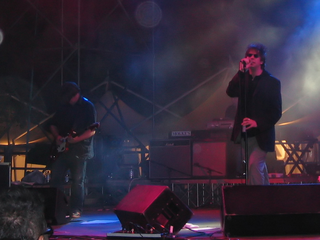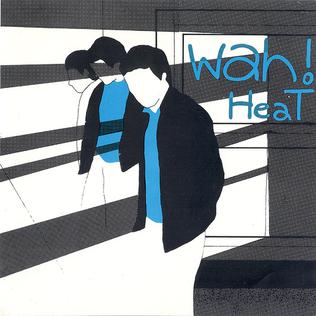Related Research Articles
The Spitfire Boys were the first Liverpool punk band to release a single. The Spitfire Boys were mainly notable for including in their line-up Peter Clarke, who went on to drum for the Slits and later Siouxsie and the Banshees and the Creatures as Budgie, and Paul Rutherford, later better known for being a member of 1980s pop band Frankie Goes to Hollywood. Jones went on to join the Photons, which also included Steve Strange (Visage) and Vince Ely.

Echo & the Bunnymen are an English rock band formed in Liverpool in 1978. The original line-up consisted of vocalist Ian McCulloch, guitarist Will Sergeant and bassist Les Pattinson. By 1980, Pete de Freitas joined as the band's drummer.
The Crucial Three were a short-lived band that existed for approximately six weeks in early 1977. They are nevertheless notable on account of the individual success of all three founding members: Julian Cope formed the Teardrop Explodes and has enjoyed a long and successful solo career as an author, photographer and singer, Ian McCulloch formed the very successful Echo & the Bunnymen, while guitarist Pete Wylie formed Wah! Heat and enjoyed major chart success with "The Story of the Blues". In those early days, McCulloch sang, Cope played bass, and Wylie played guitar. A drummer, Stephen Spence, also joined at some point in their brief life.

Crocodiles is the debut album by the English post-punk band Echo & the Bunnymen. It was released on 18 July 1980 in the United Kingdom and on 17 December 1980 in the United States. The album reached number 17 on the UK Albums Chart. "Pictures on My Wall" and "Rescue" had previously been released as singles.

The Teardrop Explodes were an English post-punk/neo-psychedelic band formed in Liverpool in 1978. Best known for their Top Ten UK single "Reward", the group originated as a key band in the emerging Liverpool post-punk scene of the late 1970s. The group also launched the career of group frontman Julian Cope as well as that of keyboard player and co-manager David Balfe. Other members included early Smiths producer Troy Tate.
Dalek I Love You were a synthpop group from the Wirral, England. At various points in their existence, the band was also known as Dalek I. Record executives at Phonogram shortened the band's name without telling them for the "Freedom Fighters" single.

From Y To Z and Never Again is an EP by the seminal punk band Big in Japan. It includes four of their six recorded songs and is notable for being the first release on Zoo Records, the label created by band members Bill Drummond and David Balfe. It was also one of the first releases that came from the late '70s-early '80s Liverpool rock scene. The EP has been out of print since 1978, but the tracks are available on the Zoo Records compilation Zoo Uncaged.
David Balfe is a musician and record company executive, most notable for playing keyboards with the Teardrop Explodes, founding the Zoo and Food independent record labels, signing Blur and for being the subject of their first number one hit, "Country House".

Kilimanjaro is the debut album by the neo-psychedelic Liverpool band The Teardrop Explodes, released on 10 October 1980. It contains versions of the band's early singles – "Sleeping Gas", "Bouncing Babies", "Treason" and "When I Dream"; reissues of the album also include their biggest hit, "Reward". The album also includes the song "Books" – originally a song by Julian Cope's previous band, The Crucial Three, it was also recorded by Echo & the Bunnymen. In 2000, Q magazine placed Kilimanjaro at number 95 in its list of the "100 Greatest British Albums Ever".

Peter James Wylie is an English singer-songwriter and guitarist, best known as the leader of the band variously known as Wah!, Wah! Heat, Shambeko! Say Wah!, JF Wah!, The Mighty Wah! and Wah! The Mongrel.
Zoo Records was a British independent record label formed by Bill Drummond and David Balfe in 1978. Zoo was launched to release the work of the perennially struggling Liverpool band Big in Japan. The label also released two singles by Lori and the Chameleons, a Balfe and Drummond band which they formed after Big in Japan folded. Zoo Records went on to release early work from The Teardrop Explodes and Echo & the Bunnymen. The label also released the first single, "Iggy Pop's Jacket", by the Liverpool band Those Naughty Lumps.
Jayne Casey is an English artistic director who was known for being involved in the Liverpool punk and new wave scene in the 1970s and 1980s, with Big in Japan, Pink Military and Pink Industry. A Keychange Inspiration Award was presented to Casey at Liverpool Sound City.

"Better Scream" is the debut 7" single released by the first band incarnation of Pete Wylie, Wah! Heat after being a member of the short-lived Crucial Three and the Mystery Girls. It was also Wylie's third serious project. When the English Opium Eaters collapsed due to musical differences, Wylie then joined local band Crash Course but left taking drummer Rob Jones with him. Wah! Heat was formed in late 1979.
Ambrose Reynolds is an English musician and artist who formed part of the 1970s and 1980s musical scene in Liverpool, playing bass in various bands.

"Brutality, Religion and a Dance Beat" is a 7" split single of two songs. It contains the songs "Big in Japan", by eponymous band Big in Japan, and "Do the Chud", by the Chuddy Nuddies, both groups formed in the 1970s punk scene of Liverpool. It was released by the Eric's label in November 1977.
"British Refugee" is the debut single released by the 1970s Liverpool punk band the Spitfire Boys, on RKO Records on 7 October 1977. It was the only disc released by this line-up, who comprised vocalist Paul Rutherford, guitarist David Littler, bassist Pete Griffiths and drummer Peter Clarke. At the time, they were one of the few punk bands from Merseyside who released a record, apart from Big in Japan and Chuddy Nuddies. Two months after its release, the band split up, but was reformed in Wales by 1979 by David Littler along with other ex-Nylonz members.
Radio Blank was an English short-lived R&B and punk band formed on the Wirral Peninsula, in November 1976, by Alan Gill (guitar), Keith Hartley (vocals), David Balfe (bass) and Steven Brick (drums).

Pink Military were a post-punk band from Liverpool. Led by former Big in Japan singer Jayne Casey, other band members included former Deaf School drummer Tim Whitaker, guitarist Martin Dempsey who also played in Yachts and It's Immaterial and drummers Chris Joyce and Budgie.
Ken Testi is British entrepreneur most notable for his involvement with the bands Queen and Deaf School and with the Liverpool music venue Eric's Club.
References
- 1 2 Shennan, P., "Memories of Eric's; Paddy Shennan recalls the sights and sounds of legendary club Eric's", Liverpool Echo , 20 September 2003, Features p26.
- ↑ "The 17 - FURTHER INFORMATION". The17.org. Retrieved 22 January 2018.
- ↑ Strong, Martin C. (2003) The Great Indie Discography, Canongate, ISBN 1-84195-335-0, p. 12
- ↑ Frame, Pete. Rock Family Tree. 1980
- ↑ "music...isms: The Eric's Progeny (1974-1980)". Music-isms.blogspot.com. Retrieved 22 January 2018.
- ↑ Reynolds, Simon, Rip It Up And Start Again: Post-punk 1978-1984, ISBN 0-571-21570-X
- ↑ Reynolds, Simon, Rip It Up And Start Again: Post-punk 1978-1984, ISBN 0-571-21570-X
- ↑ Cope, Julian (2000). Head-On/Repossessed. Thorsons Publishers. pp. 60 of Head On. ISBN 0-7225-3882-0.
- ↑ Garner, Ken (2007). The Peel Sessions. BBC Books. p. 258. ISBN 978-1-84607-326-7.
- ↑ The Zoo: Uncaged 1978-1982 at AllMusic . Retrieved July 2009.
- ↑ "Big in Japan – Where are they now?". Q . January 1992. Archived (via the Library of Mu) on 16 September 2016.
- ↑ so80s presents Alphaville (CD liner notes). Alphaville. Blank & Jones (So 80s). 2014. SC0344.
{{cite AV media notes}}: CS1 maint: others in cite AV media (notes) (link) - ↑ Gold, Marian; Lloyd, Bernhard (15 March 2019). "How I wrote 'Big in Japan' by Alphaville". Songwriting Magazine (Interview). Interviewed by Duncan Haskell. Retrieved 22 February 2020.
- ↑ "Offizielle Deutsche Charts - Offizielle Deutsche Charts". www.offiziellecharts.de. Retrieved 21 February 2023.
- ↑ McPherson, Douglas (September 2019). "Godfathers of Pop: Marian Gold". Classic Pop . Retrieved 30 June 2021.
- ↑ (link Jayne Casey interviewed by Lin Sangster, 1993 Archived 15 September 2008 at the Wayback Machine
- ↑ Pattenden, M., "A Broudie guy", The Times (1FA Edition, London), 30 October 1999, p8.
- ↑ Drummond, Bill (19 October 1996). "Shelf life: Bill Drummond reviews his own back catalogue". The Independent . Retrieved 27 February 2020.
- ↑ "BBC - Radio 1 - Keeping It Peel - 12/02/1979 Big In Japan". Bbc.co.uk. Retrieved 22 January 2018.